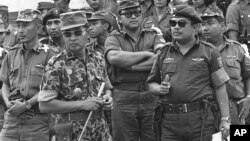JAKARTA — In a landmark move, Indonesia’s National Human Rights Commission said this week gross human rights violations were committed in mysterious summary executions in the 1980s and the communist purge in 1965. The findings are significant, but human rights proponents say there is reluctance to look into the country’s dark past.
Indonesian scholars conservatively estimate that some 500,000 suspected members of the Indonesian Communist Party were slaughtered during the 1965 coup.
Others say the figure was closer to one million.
But now, 40 years later, there is no longer confusion about who conducted the widespread and systemic killings.
This week, the government human rights agency Komnas HAM issued an 840-page report that blames security forces under former dictator Suharto for incidents of murder, rape, torture, slavery and prostitution, among other grave rights abuses.
Komnas HAM also announced that the Indonesian police and military conducted summary executions between 1982-1985 as a means to reduce the country’s crime rate.
It is now up to the attorney general’s office to further investigate these incidents of Indonesia’s murky past.
But Haris Azhar, executive coordinator of the Commission for Missing Persons and Victims of Violence, says he does not have high hopes.
"We have several experiences of negligence by the attorney general’s office on the other gross violations of human rights cases. So, I think looking at the legal mandatory it is their duty, but looking at their experiences I think we are not comfortable and really not sure about the position that has been presented," said Azhar.
For example, the attorney general’s office never looked into reports about the mysterious disappearances and deaths of activists and students in 1998 - the year that marked the end of Suharto’s 30-year dictatorship.
The AGO says cases before the year 2000 must be tried by an ad hoc rights tribunal and such a tribunal must be rubber stamped by the parliament, and the president.
Several lawmakers are already pushing for the tribunal and a victims association says they now have enough evidence to take the case to the International Criminal Court.
But Haris Azhar says that, although Indonesian President Susilo Bambang Yudhoyono, or SBY, is considering a formal apology, personal interests might get in the way.
"SBY is not totally in favor to solve the human rights violations, especially human rights violations from the past. One of the problems in [19]’65; one of the main people responsible for ’65 is his father-in-law - the father-in-law of Mr. President," he said.
No names were mentioned in the National Commission on Human Rights report, but victims’ groups have identified specific individuals involved.
Komnas HAM and survivors of the purge have urged the president to follow up on the finding and make an official state apology to seek closure on two dark chapters of Indonesia’s history.
Indonesian scholars conservatively estimate that some 500,000 suspected members of the Indonesian Communist Party were slaughtered during the 1965 coup.
Others say the figure was closer to one million.
But now, 40 years later, there is no longer confusion about who conducted the widespread and systemic killings.
This week, the government human rights agency Komnas HAM issued an 840-page report that blames security forces under former dictator Suharto for incidents of murder, rape, torture, slavery and prostitution, among other grave rights abuses.
Komnas HAM also announced that the Indonesian police and military conducted summary executions between 1982-1985 as a means to reduce the country’s crime rate.
It is now up to the attorney general’s office to further investigate these incidents of Indonesia’s murky past.
But Haris Azhar, executive coordinator of the Commission for Missing Persons and Victims of Violence, says he does not have high hopes.
"We have several experiences of negligence by the attorney general’s office on the other gross violations of human rights cases. So, I think looking at the legal mandatory it is their duty, but looking at their experiences I think we are not comfortable and really not sure about the position that has been presented," said Azhar.
For example, the attorney general’s office never looked into reports about the mysterious disappearances and deaths of activists and students in 1998 - the year that marked the end of Suharto’s 30-year dictatorship.
The AGO says cases before the year 2000 must be tried by an ad hoc rights tribunal and such a tribunal must be rubber stamped by the parliament, and the president.
Several lawmakers are already pushing for the tribunal and a victims association says they now have enough evidence to take the case to the International Criminal Court.
But Haris Azhar says that, although Indonesian President Susilo Bambang Yudhoyono, or SBY, is considering a formal apology, personal interests might get in the way.
"SBY is not totally in favor to solve the human rights violations, especially human rights violations from the past. One of the problems in [19]’65; one of the main people responsible for ’65 is his father-in-law - the father-in-law of Mr. President," he said.
No names were mentioned in the National Commission on Human Rights report, but victims’ groups have identified specific individuals involved.
Komnas HAM and survivors of the purge have urged the president to follow up on the finding and make an official state apology to seek closure on two dark chapters of Indonesia’s history.




